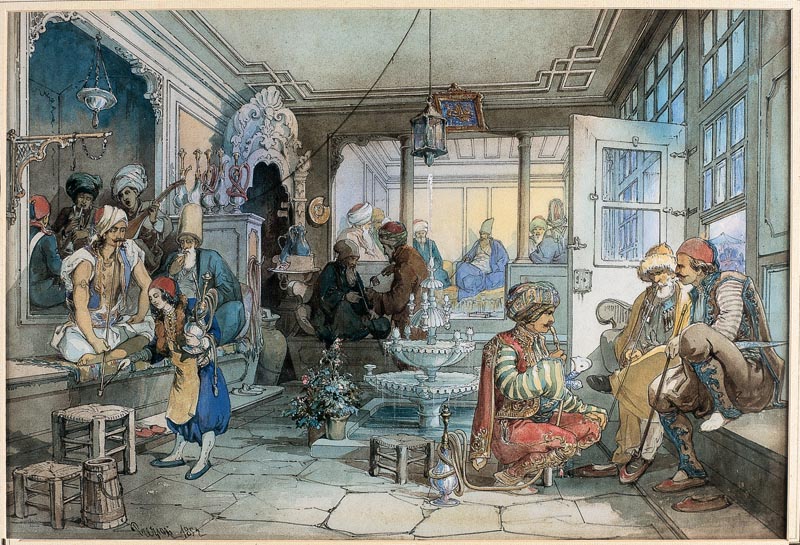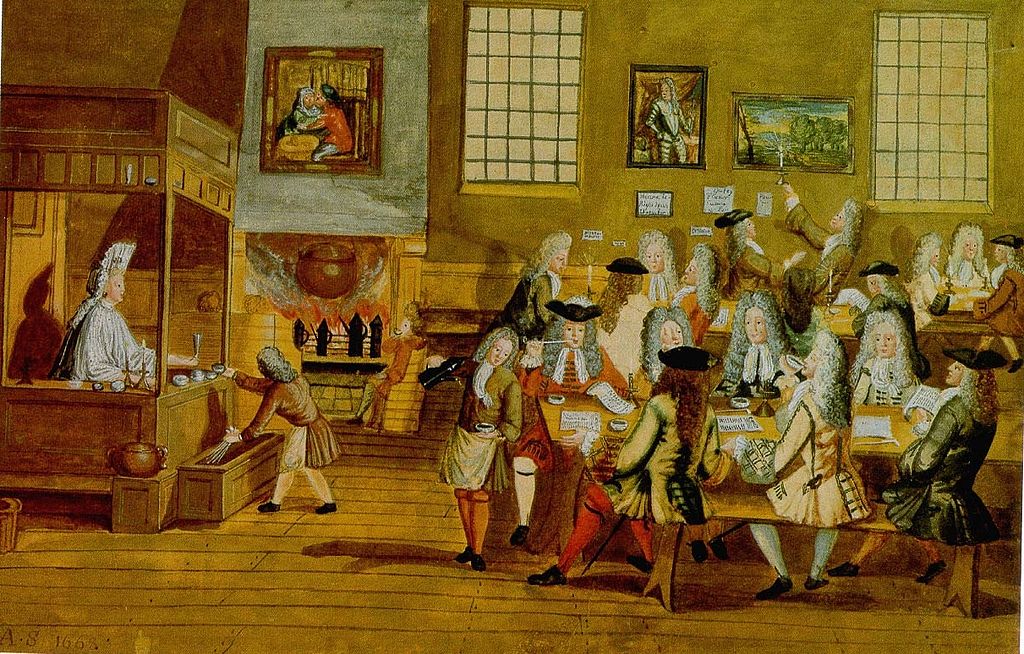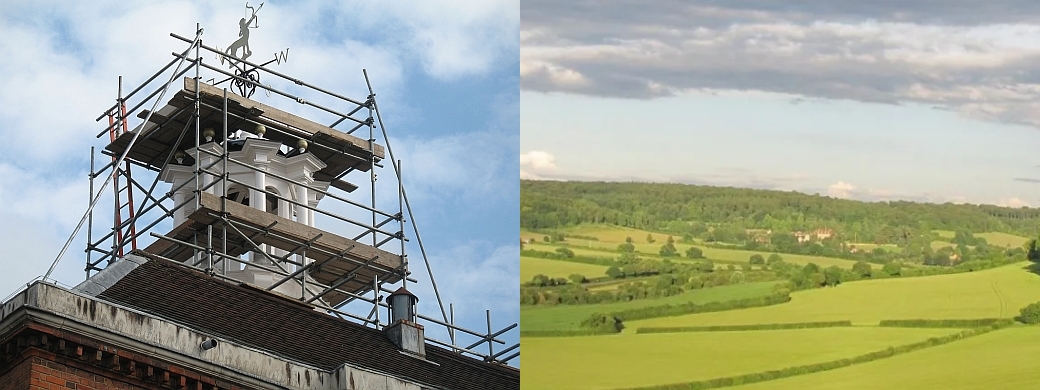. . . from De Quincey to Starbucks
Coleridge had published Kubla Khan in 1816. The first English translations of the Arabian Nights in the early 18th century had provided an aura of magic and violent intrigue. And The Travels of Marco Polo had been widely available since the Middle Ages.
As a result, the general public also began to have an infatuation with an exotic, and largely, fictional “Orient”, consisting of genies, fakirs, harems, rope-climbers, snake charmers, opium and hashish dens, and an assortment of stereotypical Oriental villains.
The grand, paranoid prose stylings of opium addict Thomas De Quincey—a loyal and rather rabid servant of empire, and also great-grandfather of the first-person, drug-confessional—did their part in propagating these images in the minds of his readers. With his essays and political screeds, he created a sense of Oriental menace in the public mind, and supplied an effective propaganda voice for British wars and invasions. But as his Confessions of an English Opium Eater (1821) suggest, the pleasures of this ersatz Orient seemed to outshine the pains.

But in addition to opium and hashish, another drug had been steadily gaining traction in the Middle East for several centuries: coffee.
The first coffee house may have originated in Mecca in the early 1500’s or late 1400’s. By the 1500’s, the drink had spread to coffee houses across the Arab world.

As it began to develop, the Middle Eastern coffee shop seemed to provide everything: musicians, dancers, drugs, gambling, chess, a place to socialize, gossip, and argue politics—and not least: the flavor, aroma, and stimulation of the beverage made from the roasted beans of the coffee plant.
With this array of attractions and enticements, the coffee house soon began to rival the influence of mosque and temple. Coffee houses were primarily a place for political gatherings, and began to pose a threat to government authority. The coffee house gradually usurped the political center of gravity, and actually began to have an impact on the structure of government itself. Reacting to this new threat Imams in Constantinople had banned both coffee houses and coffee from 1512 to 1524. And until 1839, the Ottoman Empire officially banned coffee.
But despite periodic efforts on the part of the religious and governmental authorities to stamp out this demonic newcomer, the ascendancy of this new temple centering on the coffee bean was unstoppable.
These seismic events could not escape the notice of Europeans: they had to have it for themselves! So the aforementioned European passion for a mythical Orient also led to a fascination with the coffee house culture of the East: The first coffee house opened in Oxford in 1692, and less than a year later, there were dozens, and then hundreds.
Coffee is the most social of drugs, and the fact of its mental and physical addictive properties made its presence a permanent fixture in the European firmament. Coffee houses were conducive to conducting business, and quickly became known as centers of commerce. Taverns became known as rowdy places for drinking and gambling, but coffee houses were respectable establishments where men conducted their daily affairs. In fact, a small coffee shop run by Edward Lloyd in 1668 was such a business hub, and eventually became Lloyd’s of London insurance company.

Coffee reached North America in 1668. The first coffeehouse in New York, “The King’s Arms”, opened in 1696. These Temples of Caffeination have, of course, taken over the landscape, and dispense the elixir at vast scale and furious pace. That the glorious and exotic coffee house of the East has eventually devolved into the sterile banalities of the immense Starbucks franchise is somewhat disheartening.
The comedian Jackie Mason correctly observed that: “Their coffee is burnt!” and also complained that: “The stools are too high! They’re so high that the Jews were hiring Sherpas to get to the top!”

Now I want some coffee.
LikeLike
I felt critical of this essay, as hinted to you already, Brian. And as I considered those critical thoughts in the night, I was drawn more than once to Natalie Goldberg, whose book Writing Down the Bones: freeing the writer within, is the most punchy advice I’ve ever received. Impact plus spirituality. The first time I mentioned her in Wayfarer’s, years before I obtained my own copy, I quoted these words:
The world contains both De Quincey and Starbucks. You don’t seem to love them much but that’s where you start. What I want to know, and suggest that it should be in the opening remarks, is what you love about the coffee house. From what you’ve told me elsewhere, it’s important in your life: the ambience and the beverage, both. Bryan’s fine with it, you’re preaching to the choir there. But I’m a sceptic, nothing was said here to convert me.
LikeLike
I don’t know all the back story behind the writing of this post, but I read it more as a brief history of the coffee shop, rather than an explanation of its appeal.
Most of the coffee shops I’ve been to cultivate a “shoes off, kick up your feet, make yourself at home” vibe. There are books to borrow from the shelves, games to play, chessboards to use. You can come in and set up your laptop and catch up on your schoolwork or your work work or write a novel or just screw around on the internet. I can easily see the appeal of that, even though I haven’t personally taken much advantage of it. As a married person, I’m expected to do most of my feet kicking up at home. Ah, but to be young and free and hunched over a keyboard and a styrofoam cup!
LikeLiked by 1 person
I’ve not come across one like that here in England, only the laptop thing, but that happens everywhere including buses except on the street, where the smartphone rules supreme.
LikeLiked by 1 person
Yes, I appreciate the small, independent coffee house where you can engage in all the things that you mentioned. I am a regular patron of two of the local shops in my town—both of which brew a great cup of coffee, in my opinion. I love to do my reading & writing there, as well as socialize.
LikeLiked by 1 person
Vincent,
Somehow you got the impression that I don’t like DeQuincey—he’s my favorite writer!—I absolutely love him! But I also believe that we must face facts: he was a blatant racist and propagandist. But rather than diminishing my appreciation of his work, it fascinates me that all of these disparate currents (childhood trauma, poetic genius, British imperialism, and of course, opium!) came together and provoked his marvelous Confessions (and Suspiria, etc). In fact, I am now hard at work on a DeQuincey article, which I hope to have ready in a few days.
So, you’ve changed the name from “Retreat” to “Virtual Coffee House”?
LikeLike
Well, I see that we have veered dangerously close to having a political argument—which is something that I want to avoid at all cost! (lol) But let me reply to your earlier question about why I didn’t include any mention of what I love about the coffee house. The article wasn’t supposed to be about me. My interest was in tracing a connection between “Orientalism” (which includes DeQuincey) and the development of the coffee house in the Middle East and in Europe. As far as Starbucks—I have no love for them, no! I see no harm in taking a few pot-shots at the behemoth—(they will survive!)—and wanted to end on a humorous note with Mason’s jokes.
LikeLike
my bad.
LikeLike
Apologies, Brian S., have only now added the other two illustrations which add luster to your mention of infatuation and pleasure associated with the Orient. I’d normally use the English spelling “lustre”, but in this case . . .
LikeLike
LikeLike